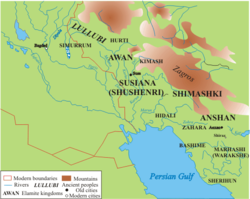
Back ሉሉቢ Amharic لولوبيون Arabic Lullubilər Azerbaijani لولوبیلر AZB Лулубеі Byelorussian Lullubi Catalan لۆلۆبی CKB Lulubi German Lullubi Spanish Lullubitar Basque
Lullubi Kingdom 𒇻𒇻𒉈𒆠 | |
|---|---|
| 3100 BC–675 BC | |
 Territory of the Lullubi in the Mesopotamia area. | |
| Common languages | Unclassified (Lullubian?) Akkadian (inscriptions) |
| Religion | Mesopotamian religions |
| Government | Monarchy |
| Historical era | Antiquity |
• Established | 3100 BC |
• Disestablished | 675 BC |
| Today part of | Iraq Iran |
Lullubi, Lulubi (Akkadian: 𒇻𒇻𒉈: Lu-lu-bi, Akkadian: 𒇻𒇻𒉈𒆠: Lu-lu-biki "Country of the Lullubi"), more commonly known as Lullu,[1][2][3][4] were a group of Bronze Age tribes who existed and disappeared during the 3rd millennium BC, from a region known as Lulubum, now the Sharazor plain of the Zagros Mountains of modern-day Sulaymaniyah Governorate, Iraq. Lullubi was a neighbour and sometimes ally with the Hurrian Simurrum kingdom and came into conflict with the Semitic Akkadian Empire and Assyria.[5] Frayne (1990) identified their city Lulubuna or Luluban with the region's modern town of Halabja. The language of the Lullubi is regarded as an unclassified language[6] because it is unattested in written record. Significantly, the term Lullubi though, appears to be of Hurrian origin rather than Semitic or the yet to arrive in the region Indo-European, and the names of its known rulers have Hurrian or more rarely Semitic influence, with no trace of Indo-European influence such as Iranic or Indo-Aryan.[7]
- ^ Eidem, Jesper; Læssøe, Jørgen (1992). The Shemshāra Archives 2: The Administrative Texts. Kongelige Danske Videnskabernes Selskab. pp. 22, 51–54. ISBN 978-87-7304-227-4.
- ^ Speiser, Ephraim Avigdor (2017-01-30). Mesopotamian Origins: The Basic Population of the Near East. University of Pennsylvania Press. p. 90. ISBN 978-1-5128-1881-9.
- ^ Campbell, Lyle (2017-10-03). Language Isolates. Routledge. p. 37. ISBN 978-1-317-61091-5.
- ^ Potts, Daniel T. (2014). Nomadism in Iran: From Antiquity to the Modern Era. Oxford University Press. p. 36. ISBN 978-0-19-933079-9.
- ^ Hamblin, William J. (2006). Warfare in the Ancient Near East to 1600 BC. Routledge. pp. 115–116. ISBN 9781134520626.
- ^ Rubio, Gonzalo. "The Languages of the Ancient Near East (in A Companion to the Ancient Near East, 2nd ed., 2007)".
- ^ Tischler 1977–2001: vol. 5/6: 70–71. On the Lullubeans in general, see Klengel 1987–1990; Eidem 1992: 50–4.